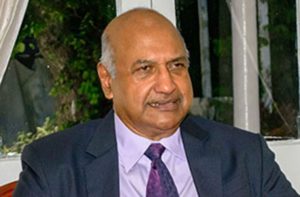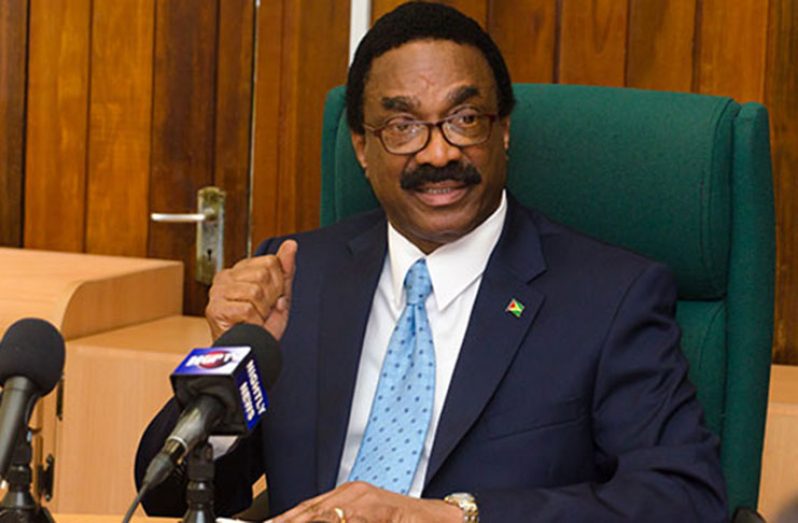-appellants get 7 days to lay over submissions
NOTWITHSTANDING a request by Attorney General, Basil Williams, for an adjournment, Acting Chancellor of the Judiciary, Carl Singh, on Friday commenced hearing an appeal against the decision of former Chief Justice Ian Chang that scrapped presidential term-limits here. And he also granted leave to the appellants, Williams and Raphael Trotman, who at the time of filing the appeal was Speaker of the National Assembly, seven days to lay over and serve on the respondents submissions in writing. He also told the Appeal Court during the opening session on Friday that despite what is in the press, the matter is one of constitutional interpretation and not a political issue. He however, did acknowledge that the case does have political consequences.
Williams had requested that the chancellor, who is head of the Appeal Court, adjourn the hearing until February and on Friday Justice Singh referred to the letter by the AG requesting that his absence be excused and acknowledged. Singh told the Court that Williams is both lawyer and politician and therefore his presence will be excused.
The Guyana Chronicle was told that Williams advanced that Solicitor-General, Sita Ramlall, who had filed the Notice of Appeal on behalf of the Attorney General has retired, and as such, he and his team need time to prepare for and take over the case.
Prior to the 2015 General and Regional Elections, Georgetown citizen Cedric Richardson had challenged the Amendments to Article 90 of the Constitution that were enacted in 2001 after the bipartisan Constitution reform process. The amendment placed term-limits on presidents. Chang later ruled that the presidential term-limit was unconstitutional without the approval of the people through a referendum. He also ruled that persons who have become Guyanese citizens by virtue of registration can run for president. Article 90 of the Constitution states: “A person elected as President after the year 2000 is eligible for re-election only once,” and clause (3), which states, “A person who acceded to the presidency after the year 2000 and served therein on a single occasion for not less than such period as may be determined by the National Assembly, is eligible for election as President only once.”
Richardson is being represented by Shaun Allicock, who has been joined by Senior Counsel,Douglas Mendes.
Appeal notice
In the Notice of Appeal, Ramlal had contended that the Chief Justice erred and misdirected himself in law when he ruled that the National Assembly, which passed Act No 17 of 2001 purporting to alter Article 90 of the Constitution by way of a two-thirds majority vote of all members, was unconstitutional and of no effect, as it failed to comply with Article 164(2) (a).
Another ground for the appeal is the contention that Justice Chang erred and misdirected himself when he ruled that the purported alteration of Article 90 by Act No. 17 of 2001 in substance and effect “diminishes the democratic rights of the electorate in electing a person of their own choice as President, by excluding from presidential candidates, citizens who have served for two terms as a President.”
Justice Chang had held that the purported alteration curtails the people’s electoral democratic choices and offends the declaration in Article 1 that Guyana is a democratic State in which sovereignty resides in the people (Article 9) and the alteration of Article 1 and Article 9 could not have been done by two-thirds majority of the elected members of the National Assembly, but by referendum.

Ramlal also contends that Justice Chang erred and misguided himself when he posited that the Proviso to Article 164 (2)(b) of the Constitution affected the purported amendment to Article 90, insofar as it seeks to “trench on and dilute” the pre-existing democratic right of the electorate to elect as president, a person of their own choice and is invalid and without legal effect for reason of non-compliance with Article 162 (2) (a) and or repugnancy with Article 1 and Article 9, both of which require a referendum for the amendment for any alteration.
The fourth ground, according to Ramlal, is that the Chief Justice erred and misguided himself when he held that while the Constitution provides for representative democracy, such representative democracy cannot trench on popular sovereignty from which it derives and which is entrenched by the requirement of a referendum. The final ground of Ramlal’s appeal is that Justice Chang erred in law in not satisfying himself that the court had jurisdiction to grant the reliefs sought by the plaintiff.
Only recently, this newspaper had reported that there are concerns over Justice Singh taking on political cases so close to his retirement. He is expected to proceed on pre-retirement leave on January 30, 2017, which should be his last day of work.
Speaking on condition of anonymity, a senior legal mind had warned that Justice Singh, who is also Chancellor (ag), should not be taking on new political cases during the time he should be on pre-retirement leave.
If the term-limit hearing continues despite Williams’s request, it means that Singh, like Chang, would have to come out of pre-retirement to conclude those cases. Chang back in February 19, 2016, in one of the most controversial acts came out of pre-retirement leave and ruled that Citizenship Minister Winston Felix and his colleague, Keith Scott, Minister within the Ministry of Social Protection, cannot sit as technocratic ministers in the National Assembly.
Government had challenged the ruling and both ministers continue to sit in Parliament.
Meanwhile, Justice Singh will turn 65 years old on February 23, 2017 and according to the rules surrounding the tenure of Chief Justice, his substantive post, he is required to demit office at that age.
“It must be ensured that the Chancellor does not take on any new cases, especially political cases. It is expected that he would want to start cases and then say he can’t go on leave, as he will have to conclude the cases,” said a prominent attorney.
Questions surrounding the retirement of Justice Singh had surfaced following a letter to the editor of this newspaper by attorney Maxwell E Edwards. Edwards had contended that when Justice Singh demits office, the office of the Chief Justice, whether by compulsory retirement or vacating at the age of 65, or by virtue of pre-retirement leave on January 30, two vacancies will exist. Justice Yonette Cummings-Edwards is currently serving as the Chief Justice (ag). She was appointed by President David Granger in December 2015. The letter writer posited that there will be a vacancy in the Office of the Chief Justice and an extant vacancy in the Office of the Chancellor.
“None of these is, or can be matters of confidentiality, but are plainly matters of public interest and concern,” he stated. The letter writer believes that there is an impending controversy on the appointment of a new Chief Justice and Chancellor, given that by virtue of the Constitution, the President is required to consult with the Leader of the Opposition.



.jpg)








